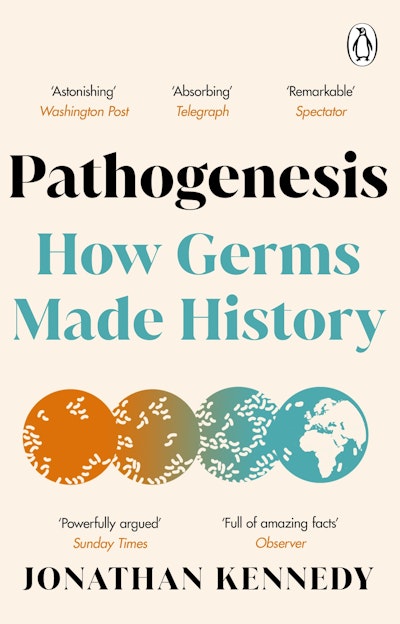- Published: 16 July 2024
- ISBN: 9781804991893
- Imprint: Penguin
- Format: Paperback
- Pages: 384
- RRP: $26.99
Pathogenesis
How germs made history
- Published: 16 July 2024
- ISBN: 9781804991893
- Imprint: Penguin
- Format: Paperback
- Pages: 384
- RRP: $26.99
Thrilling and eye-opening. From neolithic diseases to Covid-19, Jonathan Kennedy explores the enormous role played by some of the tiniest life on Earth: the power of plagues in shaping world history.
Professor Lewis Dartnell, bestselling author of <i>Origins</i> and <i>Being Human</i>
I love this surprising, learned, fascinating book which brings human arrogance into sharp relief, reminding us that the real masters of the universe are microbes. Jonathan Kennedy travels through history, unpicking everything we thought we knew; we are but the pawns and playthings of viruses and bacteria. Mind-blowing.
Cal Flyn, bestselling author of <i>Islands of Abandonment</i>
From the fall of Rome to the Spanish conquest of the Americas to the industrial revolution, germs have played as much a role in history as guns, generals and "great men"... Jonathan Kennedy restores the microbes of infectious disease to their rightful place in the story of human evolution and the rise and fall of civilisations. Science and history at its best.
Dr Mark Honigsbaum, author of <i>The Pandemic Century</i>
How a virus might have written human history. This is a fascinating, readable, and superbly researched account of how infectious diseases have shaped our history, from the Palaeolithic Era to Covid.
Professor David Christian, bestselling author of <i>Origin Story</i> and <i>Future Stories</i>
This book challenges some of the greatest cliches about colonialism and leaves you wondering why you ever gave them the time of day. A revelation, and also that rarest thing, a science title that is entirely comprehensible and often a pleasure to read.
Sathnam Sanghera, bestselling author of <i>Empireland</i>
Professor Kennedy-drawing on the latest research in fields ranging from genetics and anthropology to archaeology and economics-explores eight major outbreaks of infectious disease across the entire history of civilization... It's not often you pick up a book that promises to alter your entire understanding of the story of humanity.
LitHub
This sweeping history is Kennedy's debut, and a powerfully argued one... Pathogenesis sets out, like Yuval Noah Harari's Sapiens or Peter Frankopan's recent The Earth Transformed, to reinterpret the entire history of mankind... A fascinating and pacey run through the history of humanity from an unfamiliar perspective.
Book of the Week, Sunday Times
An absorbing book... Kennedy's intertwined story of humanity and humongous disease is told lucidly and knowledgeably, with ample historical context.
Telegraph
Kennedy's book, which aims to show how infectious disease has shaped us from the time of the Neanderthals to the era of Covid-19, is full of amazing facts... Pathogenesis doesn't only cover thousands of years of history - it seeks radically to alter the way the reader views many of the (often very well-known) events it describes.
Rachel Cooke, Observer
Pathogenesis is superbly written. Kennedy seamlessly weaves together scientific and historical research, and his confident authorial voice is sure to please readers of Yuval Noah Harari or Rutger Bregman.
David Robson, The Times
Three hundred-odd pages roam through 50,000 years, and by the last it's almost impossible to disagree that infectious diseases are our permanent companion and ultimate adversary... The fluency of Kennedy's narration is remarkable, weaving Tolkien, Game of Thrones and Monty Python into memorable and accessible explanations of genetics, evolutionary biology and demography... Pathogenesis is a humbling story for humankind.
Kate Womersley, Spectator
Our very existence and success as a species, Kennedy argues in this fascinating book, has been shaped by bacteria and viruses.
Book of the Day, Guardian
A compelling account of the role of bacteria and viruses in world history. Dr Kennedy marshals a dizzying range of material, from the transition from feudalism to capitalism in Europe to the rise of the slave trade to the defeat of the British army by American revolutionaries in Yorktown in 1781... an entertaining read.
Economist
it's refreshing to see a first-time writer take aim at what he sees as the failings of two of the best-read popular history titles of the past 30 years... The book shines when it brings cutting-edge science to bear... something that Kennedy treats with great care... germs feel powerfully alive and at work in history... Pathogenesis shows a microbial world that is as complex, dynamic, and alive as the human one, and just as consequential.
Financial Times
Gripping . . . [Kennedy] wrangles an astonishing breadth of material into easily accessible, plain prose. . . . Even readers familiar with the material will find [Pathogenesis] fascinating. . . . Kennedy will leave readers galvanized by the time they flip to the last page, having assured us that we could win the narrative back from germs - if we're able to muster the political will to do so.
Washington Post
Well-timed ... compelling ... hopeful ... Yes, our trajectory is defined by microbes. But it's also influenced by our reactions to them - and our acknowledgment of their power.
The Atlantic
Kennedy is right to state that pandemics and plague outbreaks have had a big influence throughout human history. Such dramatic episodes get written up by historians, and Kennedy describes their accounts with verve.
Nature
New and timely... His book is full of surprises... At this moment of reckoning over humankind's planetary footprint, Pathogenesis offers a humbling reminder that history is made not by the great and the good, but those who survive.
New Scientist
What has shaped the world? Not gods, not heroes, not even conquistadors, but germs... fascinating... We must collaborate... It's up to us.
New Statesman
Jonathan Kennedy’s excellent book details how germs have been laying waste to varied civilisations since Homo sapiens became dominant some 50,000 years ago... Kennedy has a fluent and engaging style. He showcases his interdisciplinary training over 300 pages that take in vast swathes of history.
The Critic
